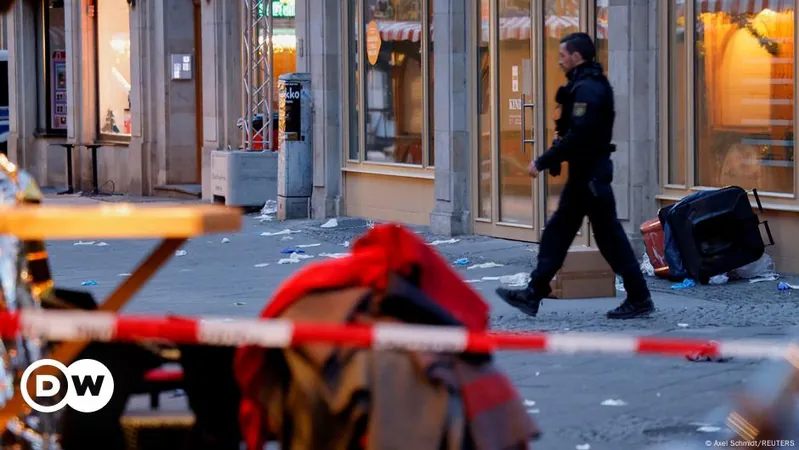
Outrage Over Magdeburg Christmas Market Attack: Security Officials Face Scrutiny
2024-12-30
Author: Ying
Magdeburg Christmas Market Attack Overview
In a gripping session on Monday, the German parliament's interior committee put security and intelligence officials in the hot seat, interrogating them about their potential oversights leading up to the tragic attack at Magdeburg's Christmas market, where five lives were snuffed out, and around 200 people were injured. The attack involved a rogue driver who mowed down a crowd using a rented BMW SUV.
Perpetrator Details
The alleged perpetrator, a 50-year-old Saudi psychiatrist named Taleb A., was apprehended at the scene. His arrest has ignited fiery discussions across the nation, with many questioning whether German authorities did enough to prevent this heinous act. Eyewitness accounts describe a scene of horror, as families and friends gathered to celebrate the festive season.
Official Responses and Findings
During the hearing, German Interior Minister Nancy Faeser shed light on the psychological profile of the accused, indicating that there were 'striking signs of a pathological psyche.' However, she acknowledged that the assailant's exact motives remain shrouded in mystery.
Taleb A. arrived in Germany as a refugee in 2006 and was granted asylum ten years later. His social media presence—boasting thousands of followers—revealed a tumultuous relationship with his homeland, often critiquing Islam and Germany's ties to it. Alarmingly, authorities in Saudi Arabia had already warned German officials about him, suggesting that he was a man of interest long before the attack.
Faeser stated that while a mountain of evidence exists from A.’s extensive social media activity, not all of it has been meticulously examined yet. 'Every stone is being turned,' she promised, although she cautioned that an exhaustive review might not have changed the course of events leading to that fateful day.
Threat Records and Security Measures
Diving deeper, law enforcement officials from the state of Mecklenburg-Western Pomerania disclosed alarming records revealing that Taleb A. had previously issued at least two threats towards German officials. In 2013, he allegedly threatened an employee concerning a delay in his specialist exam, hinting that repercussions could be likened to the Boston Marathon attack. Despite a subsequent investigation that involved a search at his residence, officials found no incriminating evidence.
Furthermore, in 2015, he addressed Germany’s top prosecutor, launching a vitriolic tirade, claiming they were a 'dirty bacteria' that required elimination for the safety of the German population. These instances raise eyebrows about the effectiveness of preemptive security measures in identifying and addressing threats.
Political Reactions
The harrowing attack has spurred significant backlash from lawmakers calling for accountability. Konstantin Kuhle from the FDP party fervently criticized the federative and state authorities for their failure to connect the dots. Meanwhile, far-right politician Gottfried Curio stated that the attack was 'foreseeable,' advocating for drastic changes in Germany's security policies, including focusing on deportations rather than naturalizations.
Political discourse surrounding the incident has intensified, with voices like Irene Mihalic from the Green Party demanding a thorough investigation into the sequence of events and information flow. 'We owe this to the victims’ families and the public,' she emphasized, echoing sentiments of foreign political figures who are urging a reevaluation of Germany's intelligence-sharing practices.
Conclusion
As investigations continue and the nation grapples with the implications of this tragedy, the debate over national security and public safety is undoubtedly far from over. The public is left asking: Could this tragedy have been averted? Were the signs clear enough for prevention? As Germany seeks answers, the shadows of this incident loom larger than ever.

 Brasil (PT)
Brasil (PT)
 Canada (EN)
Canada (EN)
 Chile (ES)
Chile (ES)
 Česko (CS)
Česko (CS)
 대한민국 (KO)
대한민국 (KO)
 España (ES)
España (ES)
 France (FR)
France (FR)
 Hong Kong (EN)
Hong Kong (EN)
 Italia (IT)
Italia (IT)
 日本 (JA)
日本 (JA)
 Magyarország (HU)
Magyarország (HU)
 Norge (NO)
Norge (NO)
 Polska (PL)
Polska (PL)
 Schweiz (DE)
Schweiz (DE)
 Singapore (EN)
Singapore (EN)
 Sverige (SV)
Sverige (SV)
 Suomi (FI)
Suomi (FI)
 Türkiye (TR)
Türkiye (TR)
 الإمارات العربية المتحدة (AR)
الإمارات العربية المتحدة (AR)